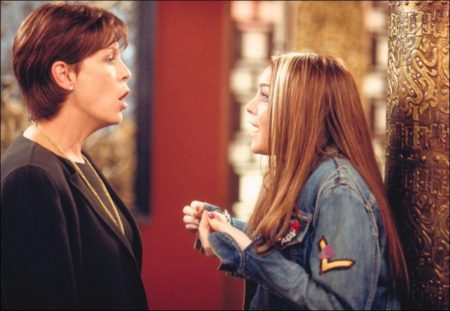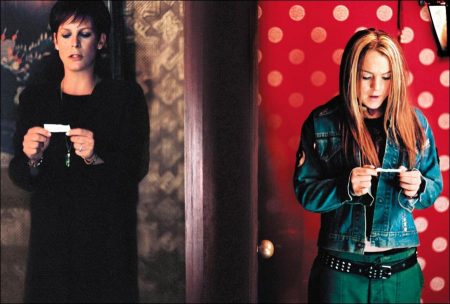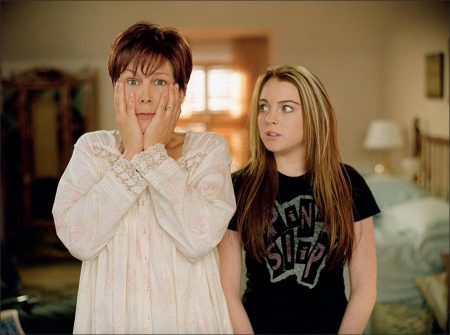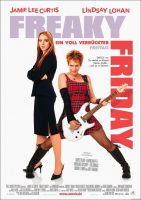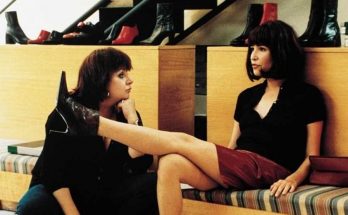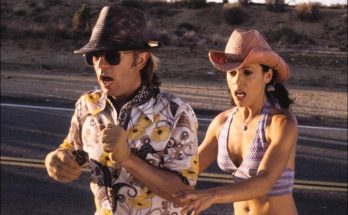This adaptation of Freaky Friday got started in 2000, when Andrew Gunn entered into a production deal with The Walt Disney Studios and began brainstorming ideas with studio executives about film projects he’d like to pursue. “There were two classic Disney movies that I wanted to remake,” remembers Gunn. “One was ‘Escape to Witch Mountain,’ and the other was ‘Freaky Friday.’
“I think the mother / daughter relationship is universal,” he continues. “The way mothers and daughters relate to each other, is, I think, different than the way fathers and sons relate to each other.”
Executive producer Mario Iscovich agrees. “I have a girl who’s eleven, and sometimes she and my wife don’t seem to be quite in sync. That familiar vein is what appealed to me about working on the project. It’s an age-old problem. Mothers have always said, ‘The kids don’t understand me,’ and kids have always said, ‘Mom doesn’t understand me.’”
Gunn, along with Disney executive Kristin Burr, had just finished formally mentoring a young writer from the Disney / ABC Fellowship Program when it was time to hire someone to work on the screenplay. Having become a fan of Heather Hach’s writing, Gunn and Burr encouraged Disney Studios head Nina Jacobson to give Hach her first paid job.
“Heather was in the middle of the second draft when ‘Princess Diaries’ came out, was a huge hit, and proved again that girls go to movies. That success encouraged us to get Heather to write quickly,” laughs Gunn.
Hach preserved the conceit of a mother and daughter switching places to learn about each other’s experiences from the 1976 film, which starred Barbara Harris and a teenage Jodie Foster. “The switch is a great arena to create physical comedy, but it needed to be given a new sensibility.
“There was a real opportunity to modernize it. Women’s roles have changed so much. I’m very fond of the original, but one of the big comedy set pieces was how crazy it is to do the laundry,” laughs Hach. “This really provided an opportunity to dig a little bit deeper, to really explore what it is to be a teenager today and what it is to start a new family.”
“The material was quirky and funny to begin with, so it suited itself to become quirky and funny again in the current day. I think the material is very contemporary,” agrees Walt Disney Pictures Presents Iscovich. “This is not your mom’s old ‘Freaky Friday.’
“I think in today’s world, the story is even more relevant than it was in the ’70s,” adds Iscovich, “because today, everybody’s so busy. You have two-parent working families. You have people who are always on the go. It seems harder and harder to communicate with each other, even though we have so many new methods of communicating.”
“The updating that has been done really does reflect what’s happening today,” adds Gunn. “It’s a much more complicated world for both people. It’s not until you’re an adult that you realize everything that your parents have done for you. So we really wanted to get into that more. Also, I think being a teenager now is a lot different than even 10 years ago. We really tried to explore that by making the mother a widow and a single parent. Then we asked the question, ‘What’s the worst thing that could happen if you’re the 15-year-old daughter?’ The answer is that your mom’s getting remarried.”
Once the script was well on its way, the search for a director began. Producers considered approximately twenty directors to find someone who could achieve the balance between big humor and big heart. A young filmmaker named Mark Waters got the job.
“When I heard they were doing a remake of ‘Freaky Friday,’ I had a vague memory that I really loved the original. But I thought there was no way they could do it,” says Waters. “Then I watched the original film again and realized that it was actually just dated enough that I thought maybe a remake could work.
“Mark Waters directed an independent film that I love—‘The House of Yes,’ starring Parker Posey and Freddie Prinze Jr.—so I was looking forward to our meeting,” says producer Gunn. “When Mark came in, he just launched into all of his notes for the movie and how he thought the movie should look… he really set the bar.”
“I immediately liked the idea of what they were going for in the script, but in the meeting I said that the movie I want to make has Anna in a rock band and at the end of the movie, they’re on stage at the House of Blues and the mother has to play for her. I expected never to hear from them again,” laughs Waters.
He was wrong. “Mark was really the one who seemed to get it the best,” says Gunn. “He had lots of ideas. He was about to have a baby daughter, which I think influenced some of his direction on the movie, the idea that his wife was about to become the mother of a daughter. So we took him into the studio and he got hired in that meeting. Then we set out to change the script with his notes.”
Finding the right actresses to play mother and daughter was of paramount importance to the project. The filmmakers were thrilled to cast Jamie Lee Curtis in the lead role of Dr. Tess Coleman. “She’s perfect for the role,” states screenwriter Heather Hach. “She’s so adorable and talented. Jamie Lee Curtis is such a great physical comedienne, and that’s just what the role needed. She’s also incredibly smart—she just is Tess.”
“This lovely movie dropped out of the sky and into my life,” smiles Curtis. “I was in the middle of a book tour when the call came in. That was a Thursday and I was working by Monday,” she comments. “I just sort of jumped in, which, in a comedy particularly, is really the way to do it. You just have to go by instinct.”
Curtis immediately liked the ideas in the script. “I think it’s funny, and since I have a teenage daughter, I hang out with teenagers. So, I could clearly see moments of potential drama and hilarity there.”
In addition to identifying with the script, the production was able to meet Curtis’ personal criteria for taking on the film project. “The shoot was all in Los Angeles, so I could be home at night, and it is a family film, which I am thrilled about because these things are important to me. Being a mother makes you re-adjust what you pick to work on. This material fits my tastes and fits into what I would take my kids to see.”
Curtis agreed with director Mark Waters that the story needed to be grounded in reality. “The movie is slapstick, a farce really,” says Curtis. “However, there is real friction between the mother and daughter. This is real stuff—the daughter being unhappy about the mother getting remarried; the mom not liking the daughter’s music.
“It’s not the kind of comedy where there’s actually a real discord between the mother and daughter,” Curtis continues. “They just don’t understand each other. Ultimately, the gift that the whole movie talks about is this gift of walking in each other’s shoes and seeing what is missing in your life. There’s actually something really beautiful that occurs in the midst of this comedy… that understanding that they find,” explains Curtis.
Director Waters agrees. “The two of them have no idea just how tough the other one has it,” he concludes. “The theme of the movie is that they both think that the other person’s life is a relative cake walk… until they spend a little time in the other’s body.”
It’s one of the ironies of the story that Tess, who is unable to connect with her own daughter, is a psychologist. “Since she thought she knew human behavior so incredibly well,” adds Hach, “I thought it would work really well comedically, that she had no idea what her daughter was going through. And that would be a really funny way to illustrate how out of touch she was.”
Curtis articulates some of the things that might be going through Tess’s head from a parent’s point of view—reasons why her relationship with Anna might be troubled.
“From a parent’s standpoint, when your child is 15 or 16 years old, you think there are only two years to go until college and you start to see your kid’s future,” comments Curtis. “You’re nervous that today’s behavior will stay with them through adulthood, since they’re almost fully cooked and you realize you can’t change them now. All the parent’s worries surface and you ask, ‘did I do a good job?’
“At the beginning of this story, we see Tess focusing on all the wrong stuff, from Anna’s point of view,” observes Curtis. On the other hand, Anna has her own blind spots. “What Anna doesn’t see is any of the social or emotional things that parents go through… concerns about money and health and whether or not we’re going to be able to make the mortgage payments. And in this story, whether or not the children are going to be damaged by the death of their father, because we try to keep this ‘everything’sgoing- to-be-okay front,’” says Curtis.
Surprisingly, it was more difficult for Curtis to play Tess than to play Anna trapped in Tess’s body. “I told Jamie from the get-go that the tougher character for her to play was going to be the psychologist,” says Waters. “Jamie actually has to subdue herself and carry herself with a little bit more of a stern demeanor in that role. When she gets to let loose and be the teenager, she is much more in her element.”
Curtis found the key to playing a teenager was to just be herself. “My daughter gave me the greatest hint. One day we were driving home from rehearsal and she said, ‘Mom, you don’t have to try so hard to be a teenager. You are the teenager. You’re the most teenager-like grownup I know.’
“She’s right,” says Curtis. “They found the most immature 43-year old woman ever born who could headline a movie. But it is flattering, because really what my daughter’s saying, in her teenage-speak, is that ‘You relate to how I feel.’”
Halfway through production, Curtis celebrated her 44th birthday on set by buying the crew a ping-pong table and initiating a highly competitive tournament. She also hung her autographed pictures of Justin Timberlake in her trailer.
“I still feel very much like a teenage girl. I’m immature and moody,” furthers Curtis. “I like to do silly, stupid things. I have to remind myself that I’m an adult on a daily basis. I’m not used to being one, and I’m sure I’ll never actually full-fledged become one, but I’m trying really hard.”
Sixteen-year-old actress Lindsay Lohan took on the challenge of playing the dual role of a teenager—and a mother trapped in a teenager’s body. No stranger to playing dual roles, having first gained recognition five years ago playing the twins Annie and Hallie Parker in Walt Disney Pictures’ hit comedy “The Parent Trap,”
Lohan was excited to return to feature films in “Freaky Friday,” playing a character so apart from herself. “Anna is very different from me,” states Lohan. “She’s a little tougher, and she doesn’t think before she speaks. She’s like most teenagers—she’s having trouble figuring herself out, so she puts up a shield and doesn’t really let certain sides of herself show.”
“To make the daughter a little more real, we wanted to have her in a band so she’d have an edge to her and a little bit of rebellion in her,” explains screenwriter Heather Hach. “Even though she’s a good kid, we wanted to give her a little bit of a bite.”
“This is not your Lindsay Lohan that people may remember from ‘The Parent Trap.’ That little girl is all grown up now,” laughs producer Gunn. “She’s amazing playing this rebellious kind of character. We always knew that she would be good, but we were just really blown away by how great she is. She’s extremely talented and we have great affection for her.”
Director Mark Waters could not agree more. “Lindsay Lohan is nothing like the character of Anna, who’s this bad attitude, punk-rocking, tough girl… almost a tomboy. That’s not who Lindsay is, and yet, she’s pulled that off brilliantly.
“At the same time she’s also been completely inhabiting the role of the mom within her body,” furthers Waters. “From ‘The Parent Trap’ her flexibility was obvious, in that she was able to layer nuances in both parts. She’s been seamless in moving back and forth between the mom and the teenager. She’s been completely impressive. Also, she’s been very convincing in all the guitar scenes.”
“Music is a really big part of Anna’s life,” comments Lohan. “Rock ’n’ roll is a way for her to let her stress and angst out. But she’s got problems with her mother, who doesn’t really understand it.”
Lohan was thrilled to be starring with Curtis. “She brings so much energy into a room,” says Lohan. “I found her to be very cool, and we really bonded. I think the fact that she has a daughter my age helped.” “If I’m alone with Lindsay, the two of us can be teenagers together very quickly,” agrees Curtis.
“The chemistry between Jamie and Lindsay was just immediate,” remembers Gunn. “The first time they met in rehearsals, we knew that it was going to work.”
Freaky Friday (2003)
Directed by: Mark Waters
Starring: Jamie Lee Curtis, Lindsay Lohan, Harold Gould, Chad Michael Murray, Mark Harmon, Christina Vidal, Rosalind Chao, Lucille Soong, Dina Spybey-Waters
Screenplay by: Heather Hach, Leslie Dixon
Production Design by: Cary White
Cinematography by: Oliver Wood
Film Editing by: Bruce Green
Costume Design by: Genevieve Tyrrell
Set Decoration by: Barbara Haberecht
Music by: Rolfe Kent
MPAA Rating: PG for mild thematic elements and some language.
Release Date: Buena Vista Pictures
Release Date: August 6, 2003
Views: 101
